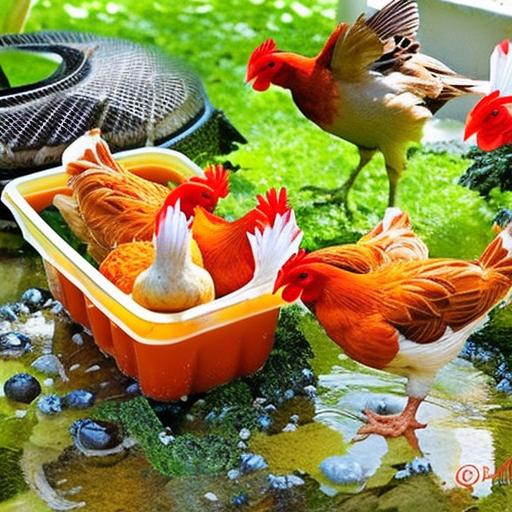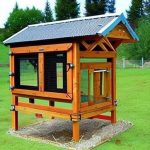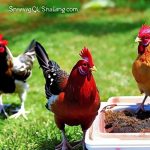Keeping chickens cool during the summer is crucial for their health and well-being. Chickens are susceptible to heat stress and heat stroke, which can have negative effects on their overall health and productivity. There are several ways to keep chickens cool, including providing shade and ventilation in the chicken coop, installing misters and fans, using natural cooling methods such as plants and trees, offering frozen treats and fresh water, adjusting feeding schedules, monitoring for signs of heat stress and heat stroke, creating a dust bathing area, and limiting activity and handling during the hottest parts of the day.
Key Takeaways
- Keeping chickens cool during summer is important for their health and well-being.
- Adequate shade and ventilation in the chicken coop are essential for keeping chickens cool.
- Misters and fans can be installed to provide additional cooling for chickens.
- Natural cooling methods, such as plants and trees, can also help keep chickens cool.
- Offering frozen treats and fresh water, adjusting feeding schedules, and monitoring for signs of heat stress are important steps in keeping chickens cool during summer.
Understanding the Importance of Keeping Your Chickens Cool During Summer
Chickens are particularly susceptible to heat stress and heat stroke because they do not have sweat glands like humans do. Instead, they rely on panting to regulate their body temperature. When the temperature rises above 85 degrees Fahrenheit, chickens can struggle to cool themselves down effectively. This can lead to heat stress, which is a condition where the chicken’s body temperature rises to dangerous levels. If left untreated, heat stress can progress to heat stroke, which is a life-threatening condition.
Heat stress has several negative effects on chickens. It can cause decreased egg production, poor egg quality, reduced feed intake, weight loss, decreased immune function, and even death. Chickens that are experiencing heat stress may exhibit symptoms such as panting, drooping wings, open-mouthed breathing, reduced activity levels, and pale combs and wattles. It is important for chicken owners to be aware of these signs and take immediate action to cool down their chickens.
Providing Adequate Shade and Ventilation for Your Chicken Coop
Proper ventilation and shade in the chicken coop are essential for keeping chickens cool during the summer. Good ventilation helps remove hot air from the coop and allows fresh air to circulate. This can be achieved by having windows or vents that can be opened and closed as needed. It is also important to ensure that the coop is not overcrowded, as overcrowding can lead to poor air circulation and increased heat.
Providing shade in the chicken coop is equally important. This can be done by placing shade cloth or tarps over the roof or sides of the coop. It is important to ensure that the shade cloth or tarps are securely fastened to prevent them from blowing away in strong winds. Additionally, planting trees or installing awnings outside the coop can provide natural shade for the chickens.
Installing Misters and Fans to Keep Your Chickens Cool
| Metrics | Description |
|---|---|
| Temperature | The average temperature before and after installing misters and fans |
| Humidity | The average humidity before and after installing misters and fans |
| Water Consumption | The amount of water used by the misters and fans per day |
| Electricity Consumption | The amount of electricity used by the fans and misters per day |
| Chicken Health | The overall health of the chickens before and after installing misters and fans |
Misters and fans are effective tools for keeping chickens cool during the summer. Misters spray a fine mist of water into the air, which helps to lower the ambient temperature. Fans help circulate the air and create a cooling breeze. Both misters and fans can be installed in the chicken coop to provide relief from the heat.
To install misters, you will need a water source, such as a hose, and misting nozzles that can be attached to the hose. The misting nozzles should be placed strategically throughout the coop to ensure even coverage. It is important to adjust the misters so that they provide a fine mist rather than a heavy spray, as a heavy spray can make the coop too wet and increase humidity levels.
Fans can be installed in the chicken coop by mounting them on walls or ceilings. It is important to ensure that the fans are positioned in a way that allows for proper air circulation. Additionally, it is important to regularly clean and maintain the fans to prevent dust and debris from accumulating.
Using Natural Cooling Methods, Such as Plants and Trees
Plants and trees can provide natural cooling for chickens by creating shade and reducing ambient temperatures. Planting trees around the chicken coop can help block direct sunlight and provide a cooler environment for the chickens. Some trees that are particularly effective for this purpose include deciduous trees, such as maple, oak, and birch, as they provide shade in the summer and allow sunlight to pass through in the winter.
In addition to trees, certain plants can also help keep chickens cool. Planting vines or creepers along the walls of the chicken coop can provide shade and help lower temperatures. Some plants that are beneficial for this purpose include morning glory, sweet potato vine, and grapevines. It is important to choose plants that are safe for chickens and avoid toxic plants.
Offering Frozen Treats and Fresh Water to Your Chickens

Frozen treats and fresh water can help keep chickens cool during the summer. Frozen treats, such as frozen fruits or vegetables, can provide a refreshing snack for chickens. These treats can be placed in a shallow dish or hung from the ceiling of the coop. The chickens will peck at the treats, which will help cool them down.
Fresh water is essential for keeping chickens hydrated and cool. It is important to provide clean, fresh water at all times, especially during hot weather. Water containers should be placed in shaded areas to prevent them from heating up in the sun. Additionally, it is important to regularly check and refill the water containers to ensure that the chickens have an adequate supply of water.
Adjusting Feeding Schedules to Avoid Heat Stress
Feeding schedules can affect chickens during the summer. It is important to adjust feeding schedules to avoid heat stress. Feeding chickens early in the morning or late in the evening when temperatures are cooler can help prevent heat stress. Additionally, it is important to provide a balanced diet that includes electrolytes and vitamins to support the chickens’ overall health and well-being.
Monitoring Your Chickens for Signs of Heat Stress and Heat Stroke
It is important to monitor chickens for signs of heat stress and heat stroke during the summer. Signs of heat stress in chickens include panting, drooping wings, open-mouthed breathing, reduced activity levels, and pale combs and wattles. If a chicken is exhibiting these signs, immediate action should be taken to cool it down. This can be done by providing shade, misting the chicken with water, or placing it in a cool area.
Heat stroke is a life-threatening condition that requires immediate medical attention. Signs of heat stroke in chickens include rapid breathing, disorientation, convulsions, and collapse. If a chicken is experiencing heat stroke, it should be moved to a cool area and given water to drink. It is important to seek veterinary care as soon as possible.
Creating a Dust Bathing Area for Your Chickens
Dust bathing is important for chickens during the summer as it helps them regulate their body temperature and keep cool. Dust bathing involves chickens rolling around in dry dirt or sand to remove excess oil and parasites from their feathers. It also helps to cool them down by allowing the dirt or sand to absorb excess moisture from their bodies.
To create a dust bathing area for your chickens, you will need a shallow container filled with dry dirt or sand. The container should be large enough for the chickens to comfortably roll around in. It is important to place the dust bathing area in a shaded area to prevent it from becoming too hot in the sun. Additionally, it is important to regularly clean and refill the dust bathing area to ensure that it remains dry and free of parasites.
Limiting Activity and Handling of Your Chickens During the Hottest Parts of the Day
It is important to limit activity and handling of chickens during the hottest parts of the day to prevent heat stress. Chickens are more active in the morning and evening when temperatures are cooler. During the hottest parts of the day, they should be allowed to rest and seek shade in the coop.
Handling chickens during hot weather can cause them stress and increase their body temperature. It is best to avoid unnecessary handling and only handle chickens when necessary, such as for health checks or to administer medication. When handling chickens, it is important to do so gently and quickly to minimize stress.
Preparing Your Chicken Coop for Extreme Heat Events
Extreme heat events can pose a serious risk to chickens. It is important to prepare your chicken coop for these events to ensure the safety and well-being of your chickens. Some ways to keep chickens cool during extreme heat events include providing additional shade, increasing ventilation, and offering frozen treats and fresh water.
Additional shade can be provided by placing shade cloth or tarps over the roof or sides of the coop. It is important to ensure that the shade cloth or tarps are securely fastened to prevent them from blowing away in strong winds. Increasing ventilation can be done by opening windows or vents and using fans to circulate the air. Offering frozen treats and fresh water can help keep chickens hydrated and cool during extreme heat events.
Keeping chickens cool during the summer is essential for their health and well-being. There are several ways to achieve this, including providing shade and ventilation in the chicken coop, installing misters and fans, using natural cooling methods such as plants and trees, offering frozen treats and fresh water, adjusting feeding schedules, monitoring for signs of heat stress and heat stroke, creating a dust bathing area, and limiting activity and handling during the hottest parts of the day.
By implementing these methods, chicken owners can ensure that their chickens stay healthy and happy during the summer months. It is important to be proactive in preventing heat stress and heat stroke in chickens, as these conditions can have serious consequences. By providing a cool and comfortable environment for chickens, owners can help them thrive even in hot weather.
If you’re looking for ways to keep your chickens cool in the summer, check out this helpful article on how to insulate a chicken coop. Insulating your coop can help regulate the temperature and provide a comfortable environment for your feathered friends during hot weather. Learn about different insulation materials and techniques to keep your chickens cool and happy all summer long.
FAQs
What temperature is too hot for chickens?
Chickens can start to experience heat stress at temperatures above 85°F (29°C).
How can I keep my chickens cool in the summer?
You can keep your chickens cool in the summer by providing shade, plenty of fresh water, and good ventilation in their coop. You can also give them frozen treats or add electrolytes to their water to help them stay hydrated.
What kind of shade is best for chickens?
Natural shade from trees or bushes is ideal, but you can also provide shade with tarps, umbrellas, or other materials. Just make sure the shade is well-ventilated and doesn’t trap heat.
How often should I change my chickens’ water in the summer?
You should change your chickens’ water at least once a day in the summer, and more often if it gets dirty or warm.
What are the signs of heat stress in chickens?
Signs of heat stress in chickens include panting, lethargy, loss of appetite, and decreased egg production. In severe cases, chickens may collapse or die.
Can I use fans to cool my chickens?
Yes, fans can be a great way to keep chickens cool in the summer. Just make sure they are well-ventilated and don’t blow directly on the chickens, which can cause respiratory problems.
Should I give my chickens ice water?
No, you should not give your chickens ice water. Cold water can shock their systems and cause them to stop drinking, which can lead to dehydration. Instead, provide cool, fresh water and add electrolytes if necessary.
What should I do if my chickens are showing signs of heat stress?
If your chickens are showing signs of heat stress, move them to a cooler area with shade and good ventilation. Provide cool, fresh water and electrolytes if necessary. If the symptoms persist, contact a veterinarian.
Meet Walter, the feathered-friend fanatic of Florida! Nestled in the sunshine state, Walter struts through life with his feathered companions, clucking his way to happiness. With a coop that’s fancier than a five-star hotel, he’s the Don Juan of the chicken world. When he’s not teaching his hens to do the cha-cha, you’ll find him in a heated debate with his prized rooster, Sir Clucks-a-Lot. Walter’s poultry passion is no yolk; he’s the sunny-side-up guy you never knew you needed in your flock of friends!







